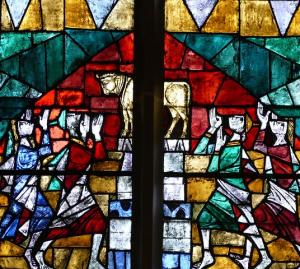The appointed gospel for Wednesday of Holy Week takes us to a dramatic scene in the middle of Jesus’s last meal with his disciples before his arrest (the early portions of the last supper narrative are the beginning of the gospel text for Maundy Thursday). The reading begins with Jesus observing that “one of you will betray me” and, a few verses later, ends with Jesus telling Simon Peter that “before the cock crows, you will have denied me three times.” Judas betrayed Jesus, while Peter denied him. In traditional interpretations, we reject Judas, considering him the villain of the story, while resonating with Peter’s weakness and ultimate repentance. But which is the greater temptation: betrayal or denial?
Kate Bowler’s recent book Good Enough, co-written with Jessica Ritchie, got me thinking about aspects of this narrative that I thought had nothing new to offer. Bowler is an associate professor of the history of Christianity at Duke Divinity School, a position that she describes as her “dream job,” which she says “has always felt like the purest expression of who I am.” I not only understand Kate Bowler’s love of the academic life and the privilege of participating in it—I could have written the preceding description myself.
With that in mind, it is somewhat of a shock when Bowler continues by saying that “I have the kind of life that is perfectly suited to idolatry of the highest order.” Her subsequent discussion of idolatry connects in interesting ways to the stories of both Judas’s betrayal and Peter’s denial. She defines idolatry not as the following of false gods, but rather as becoming comfortable with false images of the true God. Her subsequent discussion of the distinction between idolatry and true faith reminds me of Dietrich Bonhoeffer’s distinction between “cheap” and “costly” grace, where cheap grace is largely an intellectual commitment to a watered-down version of faith, while costly grace is “the treasure in the field” for which a person will give everything, even their life.

Why might a comfortable, successful life in a vocation that one considers identity-defining be “perfectly suited” to idolatry? To illustrate, Bowler looks to the most famous story of idolatry in the Jewish Scriptures, the golden calf narrative from the book of Exodus. Moses has been up on the mountain for an unexpectedly long time and the people of Israel are getting antsy. Moses’s older brother, Aaron—the designated high priest and religious leader—agrees to oversee the fashioning of the golden calf idol, and we all know how well that worked out.
Bowler notes that neither Aaron nor the children of Israel consider the calf to be a false god—they are not breaking the first commandment to “have no other gods before me.” Rather, they believe that this is an acceptable placeholder for the true god. That they are wrong about that makes them idolaters, even though they have not turned their backs on God in search of other gods. As Bowler describes it, “They did not create an image of a false God. They created a false image of the true God.”
For those of us who live relatively comfortable lives but who also claim to be persons of faith seeking to follow Jesus, the temptation toward idolatry is strong. It is very tempting and easy to turn the radical challenge of the gospel into something that aligns nicely with the commitments and perspectives that are most natural to me and that fit the lifestyle to which I have become accustomed. Costly grace morphs into cheap grace almost without noticing. As Bowler writes,
We are much more likely to do exactly what the Israelites have done: not to have a false image of a false God, but a false image of the true God. We take great comfort in our own version of God instead . . . “Oh, is that an idol? It looked so familiar I would hardly have noticed.”
Or to put it more bluntly and to relate the above to the matters of Holy Week, “My sense is that we are more likely to be Judas than Peter. Peter denies God. Judas betrays him.”
I don’t know about you, but in my religious tradition and upbringing Judas was a traitor and a scoundrel, while Peter was the alpha disciple who under pressure had a moment of extreme weakness—and who hasn’t been there? But Bowler’s point is both insightful and disturbing. As a person steeped in the Christian faith ever since I was born, I am unlikely to deny the reality of God in my life. I am far more likely to adjust my beliefs concerning God into what is most comfortable and what fits my current agendas.
Many dramatic treatments of the Passion story speculate that Judas thought he was actually still being a faithful follower of Jesus by forcing Jesus’s hand and putting him in front of the authorities. It all went horribly wrong, but perhaps his heart was in the right place. It is much easier and much more naturally human to creatively adjust one’s beliefs to one’s preferences (Judas) than to turn one’s back on one’s beliefs altogether (Peter). As Kate Bowler writes, “We are not apostates. We’re idolaters . . . After all, what is idolatry except beautiful things that do not transform us?”
It is so easy to be a person of discount faith, to inhabit cheap rather than costly grace. We are unlikely to commit the more dramatic sins. Rather, we are more likely to live comforting pseudo-lives of faith, replacing the most rigorous demands of faith with the best of what we are already doing. The temptation of Judas is far more attractive than the temptation of Peter.
For reflection: What are the ways in which we turn faith into a commodity that is affordable rather than something that demands everything? What are the ways in which we regularly turn the demands of walking with Jesus into something comfortable and manageable?













